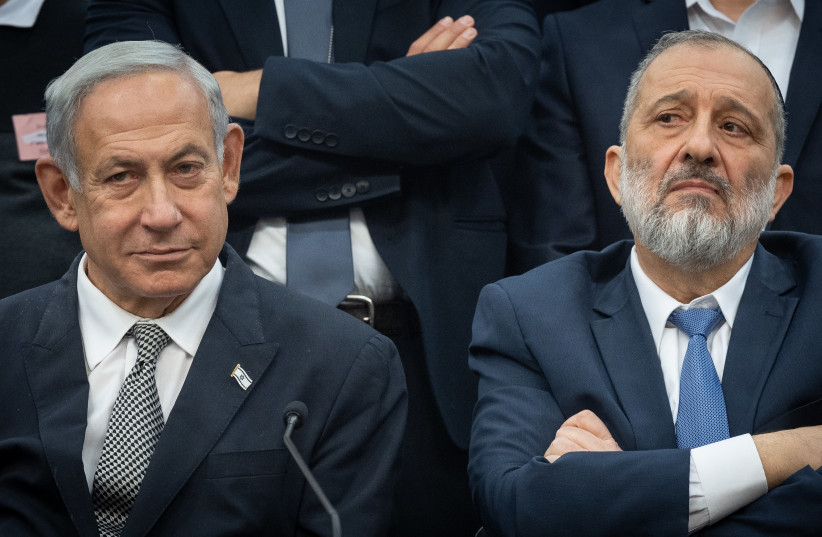Tensions among three of the coalition parties, Likud, Shas, and Otzma Yehudit, broke into the open on Wednesday over the seemingly minor issue of Prime Minister Benjamin Netanyahu’s decision to drop the controversial “rabbis bill,” which Shas chairman Arye Deri was adamant about promoting.
But like much of the tension that has risen within the coalition in recent weeks, the real issue at hand is not the rabbis bill, but one whose implications for Israel’s haredi population are far more dramatic: the haredi IDF draft bill.
According to a statement by Shas on Wednesday, Deri was guaranteed that the coalition’s leaders would apply coalition discipline to ensure that the rabbis bill would pass, even though some members of the Likud and Otzma Yehudit opposed it.

'Mutiny' within the Likud
Deri decided to move forward, but Netanyahu failed to deliver. The “mutiny” within his party included Diaspora Affairs and Combating Antisemitism Minister Amichai Chikli, who is not an MK, and MKs Tally Gotliv, Moshe Saada, Dan Illouz, and Eli Dalal, among others. Netanyahu could not ensure that the bill would pass the Knesset Constitution Committee vote, and it was dropped.
This relatively minor litmus test was indicative of the haredi IDF draft bill. Legislation has just begun in the Knesset Foreign Affairs and Defense Committee, but several Likud MKs have already announced that they will not support a compromise on the bill that would not fully meet the IDF’s requirements, which the haredi parties will find hard to accept.
The MKs who have spoken out roughly parallel those who publicly opposed the rabbis bill, and this is no coincidence: Nearly all of them face an uphill battle to receive a high spot in a Likud primary election ahead of a future election, and they could opt to join other parties. Without fear of political backlash from the Likud’s base, these MKs allow themselves to say freely what many others have said off the record.
According to the Likud’s primary rules, MKs who are chosen to the Likud list in spots reserved for the prime minister or to spots reserved to specific groups may not occupy the same slot again. Therefore, they must compete as equals against all of the other Likud MKs, many of whom have been in the party for decades.
Chikli and Saada, for example, were personal placements by Netanyahu. Gotliv occupies a spot reserved for a “new woman” who has not served yet as an MK. Illouz occupies the spot reserved for olim (new immigrants).
But the haredi IDF draft bill has brought even entrenched Likud MKs, such as Yuli Edelstein and Nir Barkat, to announce that they would not agree to far-reaching concessions to the haredim.
If Netanyahu was not able to put his MKs in line on the rabbis bill, Deri is pretty safe to assume that on the far more dramatic issue of the haredi draft bill, the outcome will be the same.
Despite the sparks that flew on Wednesday, the rabbis bill itself is unlikely to destabilize the government in the coming days. Nevertheless, the saga is a reminder that the haredi IDF draft bill might be an issue that will break the government’s back.
